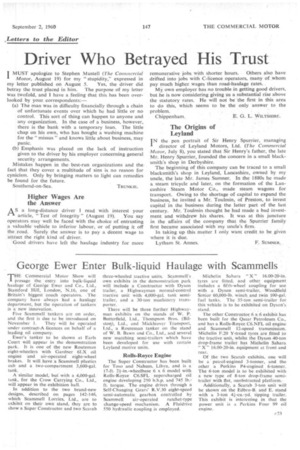Driver Who Betrayed His Trust
Page 59

If you've noticed an error in this article please click here to report it so we can fix it.
I MUST apologize to Stephen Mustell (The Commercial Motor, August 19) for my "stupidity," expressed in my letter published on August 5. Yes, the driver did betray the trust placed in him. The purpose of my letter was twofold, and I have a feeling that this has been overlooked by your correspondents:— (a) The man was in difficulty financially through a chain of unfortunate events over which he had little or no control. This sort of thing can happen to anyone and any organization, In the case of a business, however, there is the bank with a temporary loan. The little chap on his own, who has bought a washing machine for the "missus " and knows little about business, may panic.
(b) Emphasis was placed on the lack of instruction given to the driver by his employer concerning general security arrangements.
Mistakes happen in the best-run organizations and the fact that they cover a multitude of sins is no reason for cynicism. Only by bringing matters to light can remedies be found for the future.
Southend-on-Sea. TRUNKIE.
Higher Wages Are the Answer
S a long-distance driver I read with interest your article, "Test of Integrity " (August 19). You say operators may well be faced with the choice of entrusting a valuable vehicle to inferior labour, or of putting it off the road. Surely the answer is to pay a decent wage to attract the right kind of driver.
Good drivers have left the haulage industry for more remunerative jobs with shorter hours. Others also have drifted into jobs with C-licence operators, many of whom pay much higher wages than road-haulage rates.
MY own employer has no trouble in getting good drivers, but he is now considering giving us a substantial rise above the statutory rates. He will not be the first in this area to do this, which seems to be the only answer to the problem.
Chippenham. E. G. L. WILICHIRE.
The Origins of Leyland
IN the pen portrait of Sir Henry Spurrier, managing director of Leyland Motors, Ltd. (The Commercial Motor, July 8), you stated that Sir Henry's father, the late Mr. Henry Spurrier, founded the concern in a small blacksmith's shop in Derbyshire.
The beginning of this company can be traced to a small blacksmith's shop in Leyland, Lancashire, owned by my uncle, the late Mr. James Sumner. In the 1880s he made a steam tricycle and later, on the formation of the Lancashire Steam Motor Co., made steam wagons for transport. Owing to the shortage of capital to expand the business, he invited a Mr. Toulmin, of Preston, to invest capital in the business during the latter part of the last century. Mr. Toulmin thought he had made a bad investment and withdrew his shares. It was at this juncture in the affairs of the company that the Spurrier family first became associated with my uncle's firm.
In taking up this matter I only want credit to be given where it is due.
Lytham St. Annes. F. SUMNER.








































































































